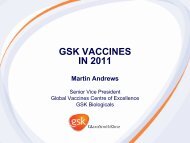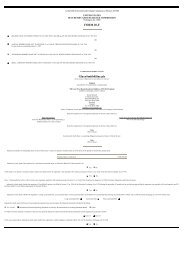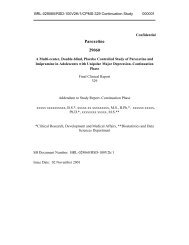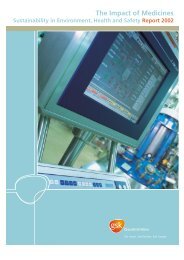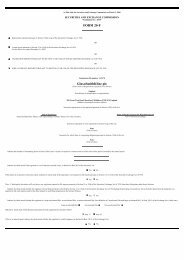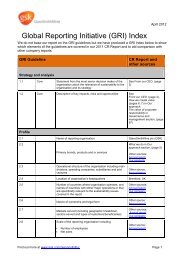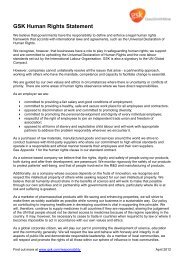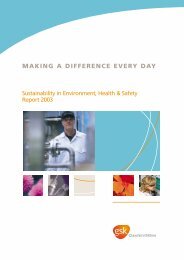GSK Annual Report 2002
GSK Annual Report 2002
GSK Annual Report 2002
Create successful ePaper yourself
Turn your PDF publications into a flip-book with our unique Google optimized e-Paper software.
Access to healthcare in the developing world<br />
Access to healthcare in developing countries presents a unique<br />
challenge to the global community. The problem, which is rooted<br />
in poverty, demands a significant mobilisation of resources, an<br />
unprecedented sense of urgency and a new spirit of partnership.<br />
It must be tackled as a shared responsibility by all sectors of global<br />
society. The Group does not have the mandate, expertise or<br />
resources to address the underlying problems that exist. However,<br />
GlaxoSmithKline is playing a vital role. There are three key areas in<br />
which it makes innovative, responsible and, above all, sustainable<br />
contributions to improving healthcare in the developing world:<br />
• investing in R&D that targets diseases which particularly affect<br />
the developing world<br />
• preferential pricing of its antiretrovirals (ARVs), anti-malarials<br />
and vaccines<br />
• and community investment activities and partnerships that<br />
foster effective health care.<br />
R&D for diseases of the developing world<br />
Continued investment in R&D into new drugs and vaccines for<br />
diseases that affect the developing world is essential to long-term<br />
improvement in the health of people in these regions, not least<br />
because of challenges such as the development of resistance to<br />
current treatments and poor patient adherence to complex<br />
treatment regimens.<br />
The Group believes GlaxoSmithKline has the industry’s most<br />
extensive portfolio of products and R&D projects for diseases of the<br />
developing world, and that it is the only Group undertaking R&D<br />
into the prevention and treatment of all three of the World Health<br />
Organisation’s (WHO) priority diseases in the developing world -<br />
HIV/AIDS, tuberculosis and malaria. The Group currently has over<br />
20 R&D projects and programmes of relevance to the developing<br />
world, ten of which are aimed at producing vaccines and<br />
medicines for diseases that disproportionally affect developing<br />
countries. GlaxoSmithKline is increasingly involved in public-private<br />
partnerships to enable a wider range of projects to be undertaken.<br />
In addition to the R&D on HIV/AIDS, an R&D group dedicated to<br />
Diseases of the Developing World has been created to ensure a<br />
focus on these diseases. Projects are prioritised primarily on their<br />
socio-economic and public health benefits rather than on their<br />
commercial returns.<br />
Preferential pricing arrangements<br />
GlaxoSmithKline has offered its vaccines to public health<br />
programmes at significant discounts for over 20 years. The Group<br />
sets a single, sustainable, preferential price for each of its ARVs<br />
and anti-malarials to a wide range of customers in the Least<br />
Developed Countries and sub-Saharan Africa - a total of 63<br />
countries. GlaxoSmithKline is committed to contributing to health<br />
improvements in a sustainable manner. Preferential prices for its<br />
ARVs and anti-malarials are therefore set at levels on which no<br />
profit is made, but that cover direct costs, so that supply can be<br />
sustained for as long as required. There has been notable progress<br />
in expanding access through preferential pricing. The Group has<br />
some 120 arrangements, covering 50 of the world’s poorest<br />
countries, to supply ARVs at preferential prices. Customers include<br />
governments, non-governmental organisations (NGOs), hospitals,<br />
academic institutions and private employers.<br />
Description of business GlaxoSmithKline 27<br />
In <strong>2002</strong>, evidence was uncovered that some of the company’s<br />
ARVs that had been sold to Africa at not-for-profit prices were<br />
being illegally re-imported into the European Union for sale at a<br />
higher price. The victims of this trade are HIV/AIDS patients in<br />
Africa and the only beneficiaries are the illegal importers. This<br />
diversion threatens GlaxoSmithKline’s ability to provide preferential<br />
prices to the developing world. The offer of not-for-profit prices<br />
requires a sustainable framework, combining the Group’s<br />
commitment to preferential pricing with commitments from others<br />
to put in place ways to prevent product diversion and to avoid<br />
price referencing against preferentially priced medicines.<br />
GlaxoSmithKline has taken steps to address the problem and from<br />
a regulatory perspective, it is now able to supply 31 countries with<br />
Combivir in a special, tri-lingual ‘access’ pack to provide a barrier to<br />
diversion. However, this alone will not fully deter illegal traders<br />
who are experts in the repackaging of medicines. Stricter<br />
regulations and enforcement to counter this illegal trade will be<br />
required.<br />
Success through partnership<br />
During <strong>2002</strong>, GlaxoSmithKline continued to engage with<br />
stakeholders working on improving access to healthcare in the<br />
developing world. The Group has a long history of supporting<br />
community investment programmes and has a wide range of<br />
partnerships to support delivery of better health and education to<br />
under-served communities around the world. The Group also<br />
consulted and worked with governments of both the developed<br />
and developing world, the United Nations, the WHO, NGOs and<br />
with the investment community and will continue constructive<br />
dialogue with organisations that share its aim of trying to improve<br />
access to healthcare in the developing world.<br />
GlaxoSmithKline is making a vital contribution to improving<br />
healthcare in the developing world. The Group will continue with<br />
its efforts, improving its initiatives by applying lessons learned and<br />
looking for opportunities to do more. For example, in September<br />
<strong>2002</strong> the Group further reduced its preferential prices for ARVs<br />
by up to 33 per cent. It looks to other stakeholders also to go<br />
further and play their part through embracing partnership,<br />
showing political will and, above all, committing significant new<br />
funding. This is critical if an improvement in healthcare and quality<br />
of life across the developing world is to be achieved.<br />
Global community partnerships<br />
GlaxoSmithKline’s community investment in <strong>2002</strong> totalled<br />
£239 million of which £112 million was related to the Group’s<br />
patient assistance programmes in the USA. This was equivalent to<br />
4.3 per cent of Group profit before tax. Many of the programmes<br />
are long-term commitments that help bring about sustainable<br />
change. The Group’s community investment activities are focused<br />
on health and education and include:<br />
Patient assistance programmes<br />
The patient assistance programmes provide access to<br />
GlaxoSmithKline’s medicines for the most needy US patients who<br />
do not have prescription drug insurance. In <strong>2002</strong>, over 410,000<br />
patients received medicines through the Group’s patient assistance<br />
programmes, at a value of $168 million.



